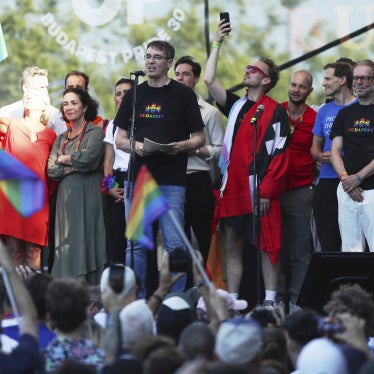Dear Mr Valinskas,
On June 26, 2009 the President of Lithuania vetoed the ‘Law on the Protection of Minors against the Detrimental Effect of Public Information.' On July 7, 2009 the Seimas voted to reconsider the law and will sit in a plenary session on July 14, 2009 to decide whether to overturn the Presidential veto.
On behalf of Human Rights Watch, I ask you to use your influence to ensure that the Presidential veto will not be overturned by the Seimas and that the human rights of all persons in Lithuania, including those of young people, will be protected.
The law would ban materials that "agitate for homosexual, bisexual and polygamous relations" from schools or public places where they could be seen by youth, on the grounds that they would have a "detrimental effect on the development of minors."
The law is an unjustified interference with the right to freedom of expression protected by international treaties to which Lithuania is a party. It would violate the right to equality by creating an unacceptable environment of state-promoted discrimination against lesbian, gay, bisexual, and transgender (LGBT) people, including youth. It would interfere with the rights of human rights defenders to promote all human rights and to engage in free discussion about rights principles. It would threaten the health and well-being of Lithuanian youth by restricting their access to information necessary for them to make critical decisions about their lives, and could potentially have life-threatening effects by censoring accurate information about HIV and AIDS.
Lithuania is member of the European Union. Article 6.1 of the Treaty of the European Union provides that "The Union is founded on the principles of liberty, democracy, respect for human rights and fundamental freedoms, and the rule of law, principles which are common to the member States." As a member of the Council of Europe, in 1995 Lithuania ratified the European Convention for the Protection of Human Rights and Fundamental Freedoms. Article 10 of the Convention states that "Everyone has the right to freedom of expression. This right shall include freedom to hold opinions and to receive and impart information and ideas without interference by public authority and regardless of frontiers..."
In its article 14, the Convention also prohibits discrimination in the enjoyment of the rights and freedoms set forth in the Convention.
The European Court of Human Rights, which authoritatively interprets and enforces the Convention, has recognized in the 2003 case of Karner v. Austria that sexual orientation is covered by article 14 of the European Convention on Human Rights (as well as the explanatory memorandum of Protocol No.12).
In the 2007 case of Baczkowski and others v. Poland- the European Court of Human Rights, referring to the importance of pluralism in a democratic society, stressed the State's positive obligation to secure the effective enjoyment of freedoms of assembly and association. In finding against Polish authorities' efforts to ban LGBT people's peaceful public demonstrations, the Court observed that "this obligation is of particular importance for persons holding unpopular views or belonging to minorities, because they are more vulnerable to victimization" (para.64).
These obligations bind Lithuania to respect, protect, and promote the freedom of expression for all people, regardless of their sexual orientation.
The law would also be in violation of the Convention of the Rights of the Child, ratified by Lithuania in 1992. Article 13 paragraph 1 of the Convention of the Rights of the Child states that a child shall have the right to freedom of expression; "this right shall include freedom to seek, receive and impart information of ideas of all kinds". The UN Committee on the Rights of the Child has held in general comments 3 and 4 of the Convention that these protections include discrimination based on sexual orientation.
Furtermore, article 7 of the Declaration on Human Rights Defenders provides that ‘Everyone has the right, individually and in association with others to develop and discuss new human rights ideas and principles and advocate their acceptance." The 2007 report of the UN Special Representative on human rights defenders mentions defenders of lesbian, gay, bisexual and transgender rights, and cites articles 2 and 12 of the declaration to remind states of their responsibility to protect human rights defenders.
The proposed law also contradicts Lithuania's public commitments undertaken in signing a joint statement on human rights and sexual orientation and gender identity, presented by 66 States at the General Assembly of the United Nations on December 18, 2008.
Inter alia, the statement reads:
10. We call upon all States and relevant international human rights mechanisms to commit to promote and protect the human rights of all persons, regardless of sexual orientation or gender identity.
13. We urge States to ensure adequate protection of human rights defenders, and remove obstacles which prevent them from carrying out their work on issues of human rights and sexual orientation and gender identity.
If the Seimas were to overturn the Presidential veto, Lithuania would become a state implementing discriminatory and stigmatizing legislation despite being a member of the Council of Europe and the European Union. Youth will not have access to information they need to protect their health. Human rights defenders working on sensitive issues related to sexual orientation and gender identity will be prevented from publicly addressing these topics.
I call upon you as Speaker of the Seimas to ensure that Lithuanian legislation respects that all persons in Lithuania, including young people, fully enjoy the right to freedom of expression - including the right to seek, receive and impart information, without discrimination of any kind.
I call upon you to use your influence that the Presidential veto will not be overturned.
Yours sincerely,
Boris Dittrich
Advocacy Director
Lesbian, Gay, Bisexual and Transgender Rights Program
Human Rights Watch







